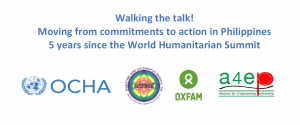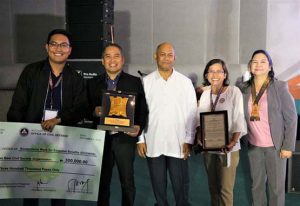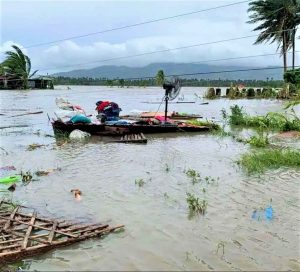As ECOWEB continues its advocacy on localization through Survivors and Community-led Response (sclr) approach, Self-Help Group (SHG) leaders facilitated the distribution of cash assistance in their respective purok.
Allowing them to facilitate the distribution of the cash assistance within their group is a reflection of how sclr approach empowered the people and the community itself. It is also a manifestation of trust building between and among the leaders and its members.
“Sclr allows people to recognize their best potential by letting them lead and come up with actions to improve their lives. This approach allows them to assess their needs and vulnerabilities amidst the crisis and find the appropriate solutions. The interventions done emanate from their defined responses maximizing local resources within.” said Renefe Mosot-Padilla, project coordinator of the project.
In the midst of pandemic where vulnerable families and marginalized communities are mostly affected, it is quite complicated for them to sustain their basic needs to survive.
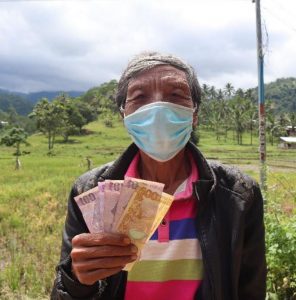 Abubacar Tumboko is a farmer from barangay Lininding, Munai and a senior citizen with five dependents. As a farmer, he faced a lot of difficulties when Typhoon Vinta (Tembin) hit their community. Crops were damaged and his main source of income were totally devastated by the impact of the typhoon.
Abubacar Tumboko is a farmer from barangay Lininding, Munai and a senior citizen with five dependents. As a farmer, he faced a lot of difficulties when Typhoon Vinta (Tembin) hit their community. Crops were damaged and his main source of income were totally devastated by the impact of the typhoon.
Tumboko also expressed that with the current COVID-19 outbreak situation, it added burden to their family since their family’s source of income was interrupted. Their produce was also wasted as community quarantine protocols put market and business operations on hold.
“With the cash received, I will buy some of my maintenance medicine and allocate a part of it for our daily consumption such as rice and fish.” Tumboka said upon receiving a total amount of 960 Philippine peso.
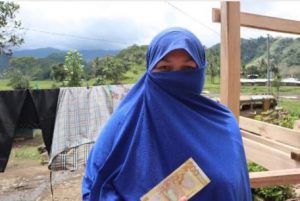 Liling Macabangon, 30, a mother of two children also received cash assistance. With her farmer husband, they received a total of Php 560.00 and happily expressed that they will allot a part of the money to purchase seedlings for their farm lot while the remaining amount will be used to buy kilos of rice and sugar.
Liling Macabangon, 30, a mother of two children also received cash assistance. With her farmer husband, they received a total of Php 560.00 and happily expressed that they will allot a part of the money to purchase seedlings for their farm lot while the remaining amount will be used to buy kilos of rice and sugar.
Meanwhile, Salma Armel, a mother of ten children, received Php 860.00. According to her, she will spend the cash assistance for their family’s basic needs such as rice and hygiene products.
The same scenario with Norjana Lidasan, a mother of two children and a volunteer Arabic teacher. She received Php 660.00 and shared that she will spend it to buy some hygiene products and her vitamins as she is currently pregnant.
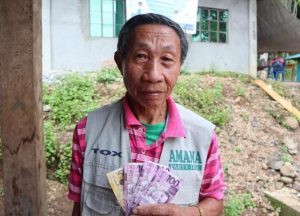 Sultan Cali, 63, received Php 860.00 and he will spend it to buy dried fish for longer consumption. The remaining amount will be kept for emergency purposes like “Tabang” (Literally means help – within the family or community and a social obligation among the M’ranao tribe).
Sultan Cali, 63, received Php 860.00 and he will spend it to buy dried fish for longer consumption. The remaining amount will be kept for emergency purposes like “Tabang” (Literally means help – within the family or community and a social obligation among the M’ranao tribe).
As the highlight of the cash assistance process, the community decided to deduct Php 60.00 per family for the purchase of seeds that will be planted within the barangay which will benefit them on resource and income-generation, and environmental protection and disaster risk management. The small amount was collectively decided by them without having second thoughts on deducting their per household cash support for this specific community initiative.
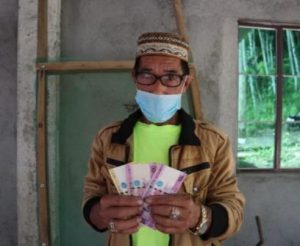
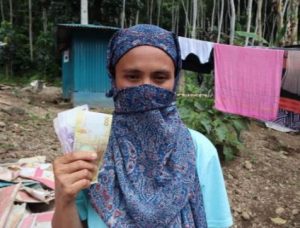
These small stories are mirrors of the situation of many people in the communities that the organization is operating. It might be a simple and a small assistance for many, but to support families like them, this small amount or assistance is a huge help among the beneficiaries.
It is also a manifestation that people in the community have prioritized what their family currently needs and set aside other untimely and irrelevant things to buy. Also, they have their own initiative to help the entire community with the seedlings for sustainability and protection.
Generally, this what drives the sclr approach – elevating people’s decisions, making it their own and trusting their potentials to survive and sustain their motivation to be better from the crisis encountered. This also validates the claim of people on the ground that cash assistance is effective because they know how to manage the amount and prioritize on what they see as more relevant in their current situations.
The distribution of cash assistance is a component of the project entitled, “Enhancing Local Community-Based DRRM for Typhoon Vinta Affected Barangays in Munai and Salvador”.
Along with this are components on capacitating local communities to disaster risk reduction management, livelihood and support to farm recovery. This is supported and funded by AWO International and Aktion Deutschland Hilft (ADH) which runs from September 2019 to January 2021.
Article and photo contributors: Tasnim Racman and Khalid Bantog


